Japan's Ambassador to Azerbaijan, Katsuya Watanabe spoke in an interview with Report about the Grassroots Human Security program implemented by the Japanese government in Azerbaijan, investments in liberated territories, energy projects implemented in the Nakhchivan Autonomous Republic, and his country's participation in COP29.
- Mr. Ambassador, you started your term in Azerbaijan a short time ago. Have you had the opportunity to visit the regions? In general, we would like to know your impressions about Azerbaijan.
- Since the beginning of my mission in Azerbaijan in December 2023, I had the opportunity to pay both working and personal visits to a number of charming regions of Azerbaijan. Azerbaijan is a country with many historical monuments, such as the Old City of Baku, the Khan Palace and the historic center of Shaki, which is included in the UNESCO World Heritage List, as well as mysterious landscapes such as the Caspian Sea and the Caucasus Mountains. The abundant and delicious food and the mild climate make it very convenient to live here. At the same time, it is very gratifying that the people of Azerbaijan are very friendly and always have a warm attitude towards me and the Japanese people. In my opinion, what makes Azerbaijan even more attractive are its people.
- It is common knowledge that the Japanese government implements the Grant Assistance for Grassroots Human Security Project in Azerbaijan. What projects have been implemented in Azerbaijan under this program, how many districts did they cover, and what is their total financial value? What is planned to be done in healthcare, education, and agriculture under this program this year and further?
- The Japanese government has implemented 286 projects in 58 districts of Azerbaijan under this program since 2020, including the construction and repair of kindergartens, medical centers, water supply infrastructure, irrigation, and others. The total value of all these projects is about $24 million.
The grant assistance program is a project designed to meet the basic needs of people living in the districts and improve their living conditions. These projects are not based on the annual planning prepared by the embassy but based on the applications submitted by the applicant organization. The embassy of Japan hopes that even better project proposals will be presented by the people of Azerbaijan.
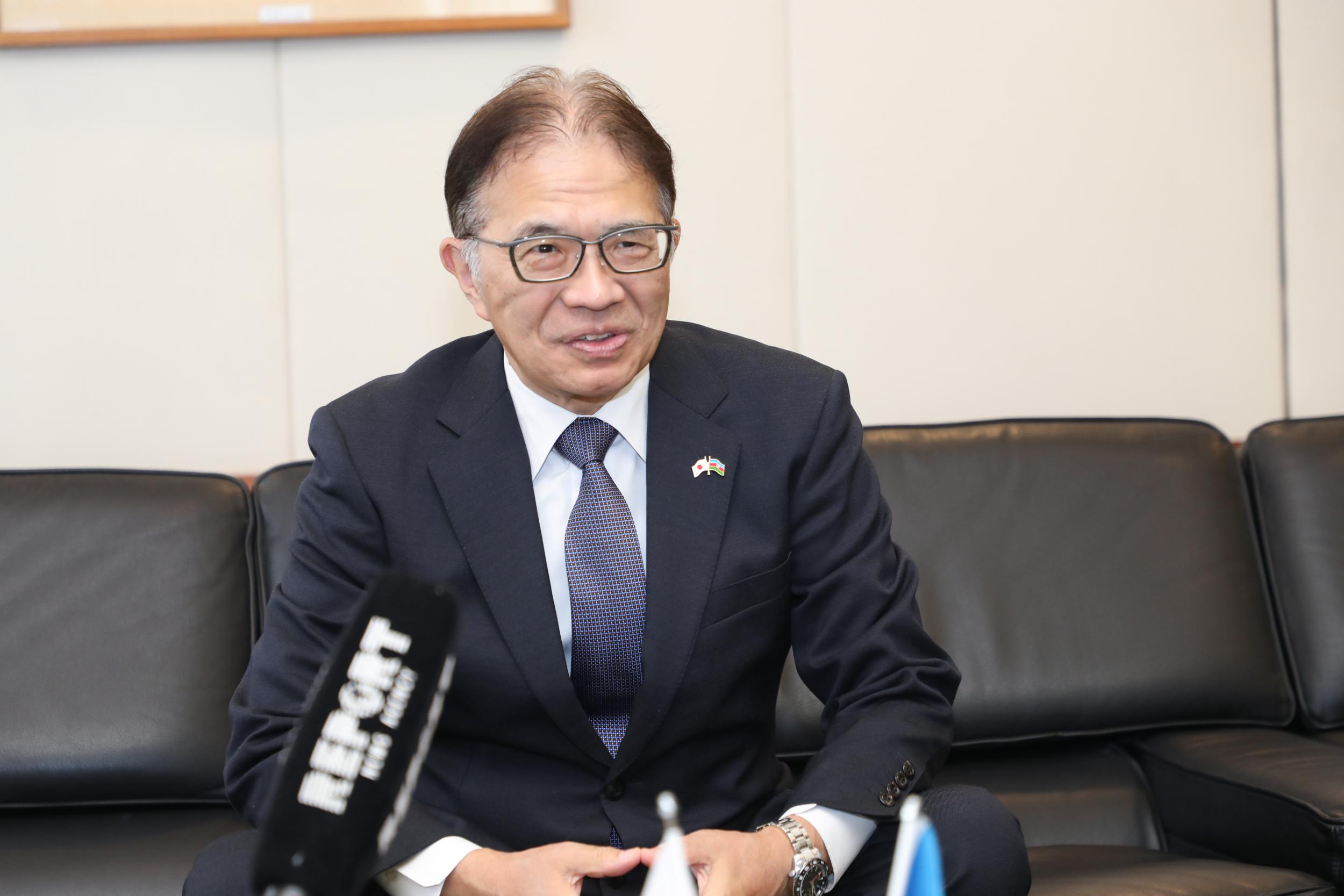
The program also provides funding for small projects in areas such as education, healthcare, and public hygiene that will directly benefit people. Non-profit organizations, local authorities, educational institutions, medical institutions, and others can apply for grant assistance. The embassy hopes to receive applications from such non-profit organizations.
- Apart from the mentioned grant aid, what other projects has the Japanese government implemented in Azerbaijan? What areas are these projects focused on, and how much are those projects worth?
- According to the statistics of 2021, the total amount of grant aid implemented by the Japanese government in Azerbaijan is about $100 million. In addition to the Grant Assistance for Grassroots Human Security Project, we also implemented the project of providing equipment for digging irrigation canals to the former Azerbaijan Amelioration and Water Management OJSC.
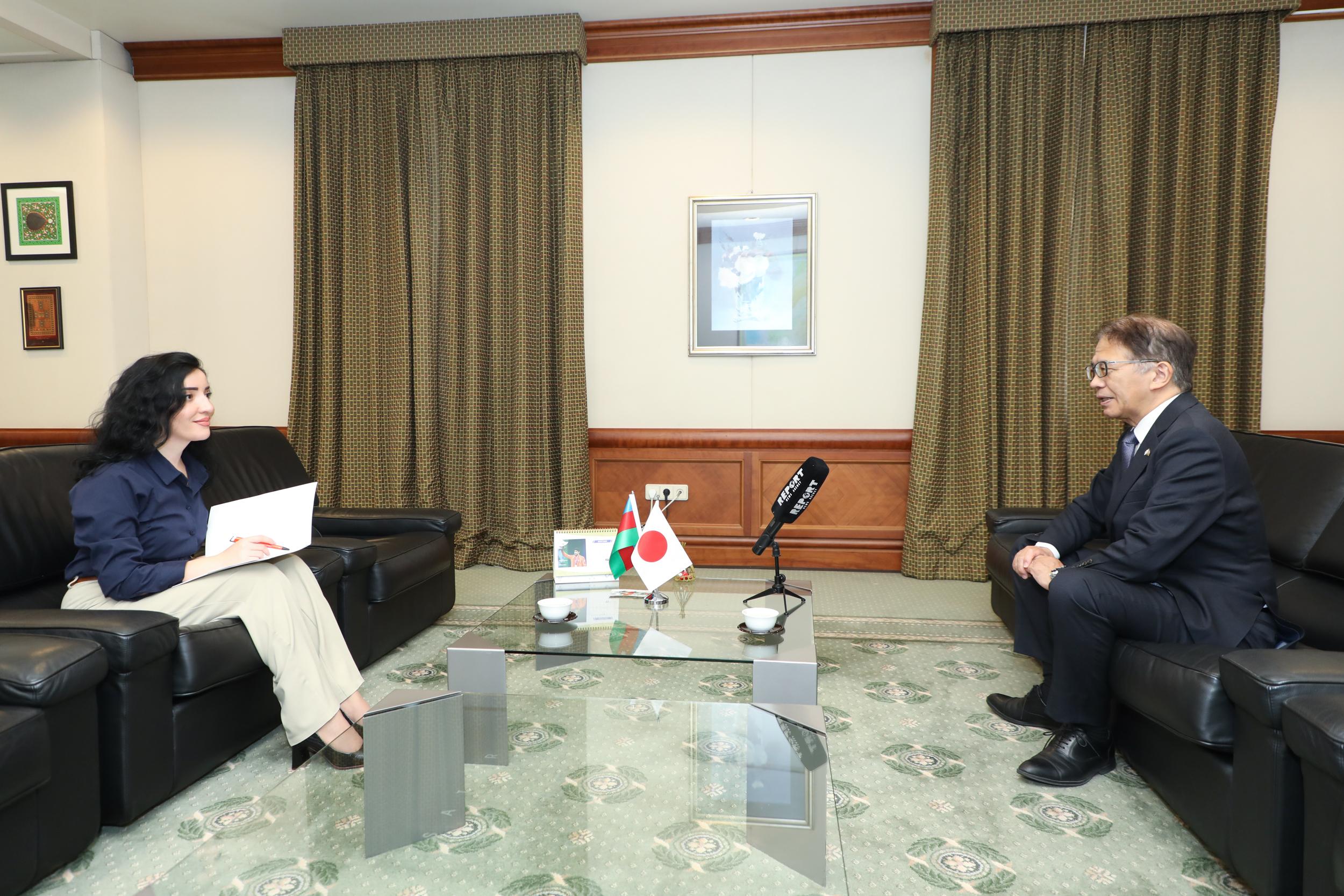
- Mr. Ambassador, taking into account Japan's successes in healthcare and technology, we would like to know if there is any cooperation between Azerbaijan and Japan in the field of education. Are there plans to organize programs for Azerbaijani students to study in Japan?
- Various educational systems are applied in Japan to accept students from all over the world, including Azerbaijan. By using such educational systems, many students from Azerbaijan have studied in Japan, and currently, Azerbaijani students are studying in various universities in Japan. These persons educated in Japan laid the foundation for the establishment of bilateral relations between our countries by working in various public and private institutions of Azerbaijan, schools, as well as in Japanese companies and in a number of other fields. Azerbaijanis educated in Japan are very valuable for both countries. Therefore, I hope that the number of Azerbaijanis studying in Japan will increase.
- In which areas in particular are Japanese companies' investments directed in Azerbaijan? And which other industries do you think are attractive for investments?
- The main part of investments is directed to the oil and gas and energy sectors. I think the long-term participation of INPEX and ITOCHU companies in the Azeri-Chirag-Guneshli and Baku-Tbilisi-Ceyhan projects testifies to good bilateral economic ties between our countries. In addition, the efforts of the Azerbaijani government for green development and favorable logistic concepts are also attractive to Japanese companies. There is hope for the development of cooperation in the tourism sector.
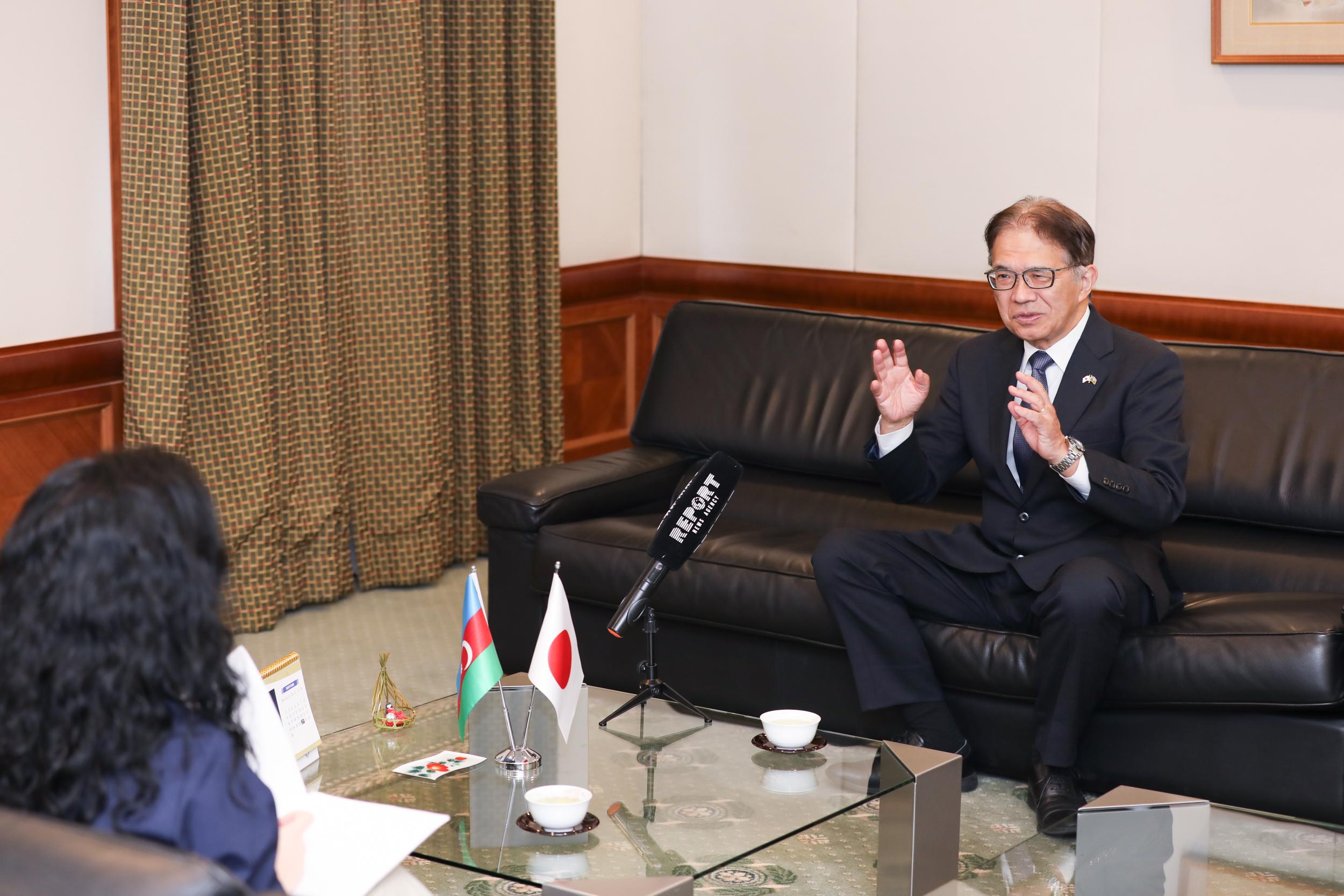
On August 4, 2023, Azerbaijan and Japan adopted the Convention "On the Elimination of Double Taxation with respect to Taxes on Income and the Prevention of Tax Evasion." The countries are currently in talks on the early signing of an investment agreement. Such efforts improve the investment climate between our countries. I hope this will lead to increased investments.
- The liberated city of Aghdam is compared to Hiroshima. Today, Hiroshima has become a center of peace and coexistence, with traces of the atomic bombing erased. Work is also being done in Aghdam to eliminate traces of occupation and vandalism. Will Japan support Azerbaijan in these efforts?
- 79 years ago, the city of Hiroshima was destroyed by a nuclear bomb, claiming numerous lives. Today, modern Hiroshima is considered a symbol of peace and hope. Those who barely survived there, overcame their grief and tirelessly rebuilt the ruins from which no plant was said to grow, thanks to the support they received from inside and outside of Japan over the past 75 years, and today modern Hiroshima is recognized as a symbol of peace and hope in the world. I think that the reason for this is not only that Hiroshima was a victim of the atomic bomb, but also that the city was saved from destruction, that it contributed to the abolition of nuclear weapons, and that it is a city striving for eternal peace in the world. I wish for Aghdam to also be restored as a symbol of peace. The Japanese side is ready to provide all possible support to Azerbaijan.
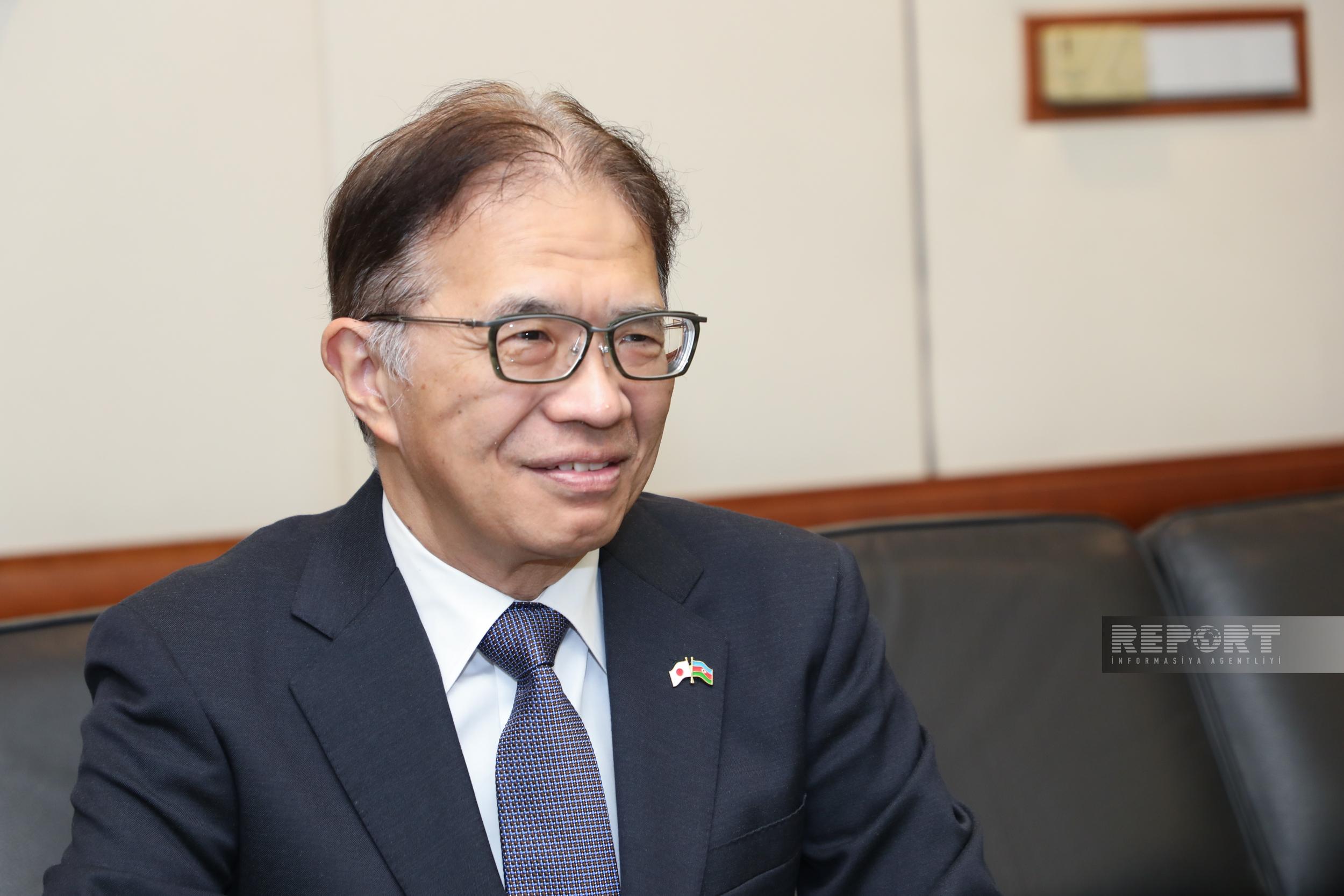
- In general, which projects related to the restoration of Azerbaijan's liberated territories involve Japanese companies? What cooperation opportunities do you think are there for Japan in these territories?
- The Azerbaijani government is implementing important projects to restore all infrastructure in the Karabakh region, and creates conditions for the return of residents there. In 2021, the Japanese company TEPSCO developed an electricity master plan that takes into account the use of renewable energy sources and the concept of a smart city in this region. Japan supports the declaration of liberated territories as a green energy zone and the government's focus on transitioning to zero waste. We intend to cooperate by exchanging various information between Japan and Azerbaijan, which are like-minded in the fight against climate change.
- Azerbaijan's Deputy Foreign Minister Elnur Mammadov said in one of his speeches that Japanese companies are implementing various energy projects not only in the Karabakh region but also in the Nakhchivan Autonomous Republic. We would like to know about the details of these projects.
- The Japanese company TEPSCO is also working on a plan to build a green energy zone in Nakhchivan. As far as I know, a plan is being developed to utilize Japan's abundant renewable energy resources and energy-saving technologies.
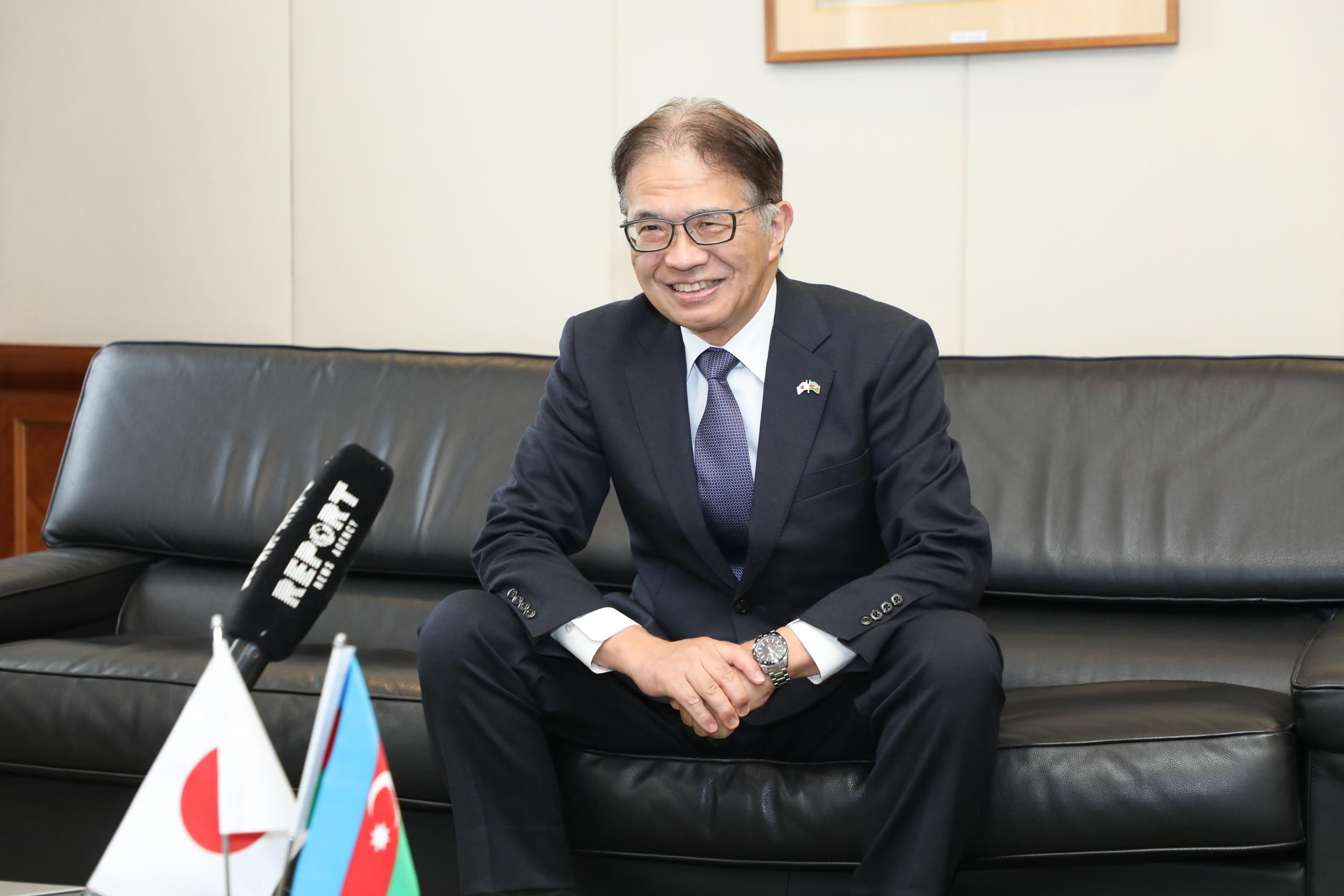
- Earlier, you met with Azerbaijani Minister of Ecology and Natural Resources, COP29 President-Designate Mukhtar Babayev. What other institutions of Azerbaijan did you have meetings within the framework of COP29 and what kind of cooperation is expected? For example, will there be anything new regarding the green and renewable energy cooperation between Japan and Azerbaijan?
- I wish success to the government of Azerbaijan for hosting the COP29 event and express my deep respect. Japan intends to continue various activities to realize a decarbonized society as early as possible before the second half of this century. In September 2022, the governments of Japan and Azerbaijan agreed to establish a Joint Crediting Mechanism (JCM) as a concrete initiative demonstrating cooperation in the environmental field between the two countries, and a memorandum of cooperation was signed. Hopefully, the Joint Crediting Mechanism will contribute not only to the expansion of measures aimed at reducing gas emissions in Azerbaijan, but also to the implementation of green projects and investment by Japanese companies, and, overall, further boost the economic cooperation between the two countries..
- Are mutual visits of officials expected in the near future? Which Japanese officials will participate in COP29 in Baku?
- These issues are currently under discussion. Authorized ministers and other Japanese officials are expected to attend the COP29 event. I hope this will serve as an occasion for the further deepening of bilateral ties between Japan and Azerbaijan.


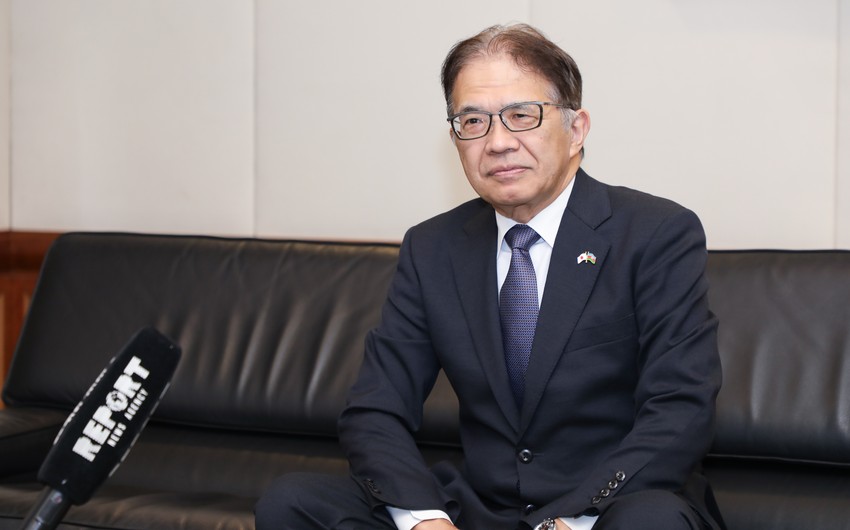 https://static.report.az/photo/afb3df0e-2054-3c7f-a1c5-24d515742d00.jpg
https://static.report.az/photo/afb3df0e-2054-3c7f-a1c5-24d515742d00.jpg

